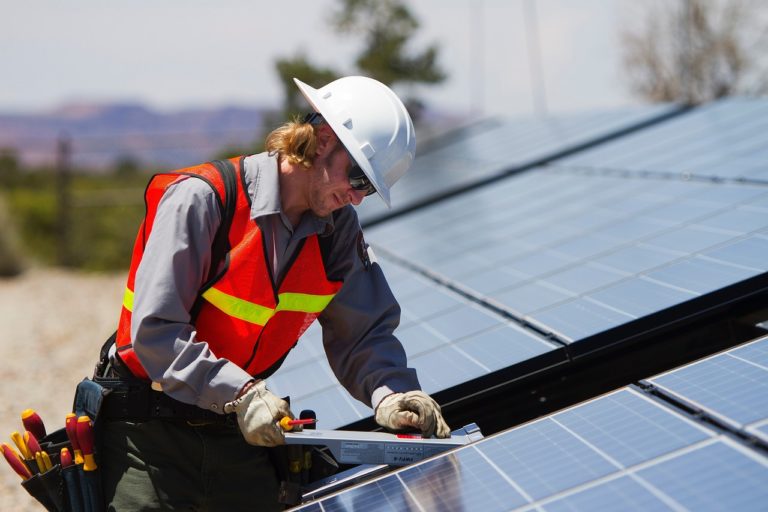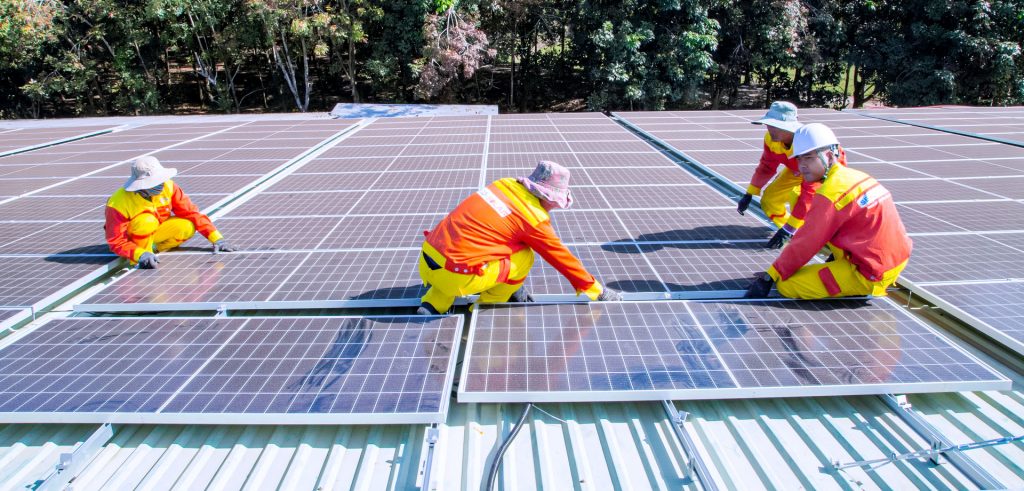Are you considering installing solar roofing in Phoenix, Arizona? With the rising cost of electricity, solar energy has become an attractive alternative to traditional sources of power. Installing a solar panel system on your roof can significantly reduce your utility bills and even provide additional income through net metering. However, before you make the switch to solar power, it’s important to understand the costs associated with installation and how to budget for them.
The cost of installing solar roofing in Phoenix varies depending on the size and type of system you choose. Factors such as the complexity of the installation, the quality of materials used, and local permitting costs all play a role in determining how much you should expect to pay for your install. Additionally, there are various incentives available that can help offset some of these costs.
Benefits Of Installing Solar Roofing In Phoenix
Installing solar roofing in Phoenix has many benefits. Not only does it reduce your energy costs, but it also increases the value of your home. Plus, you’ll be helping to reduce your carbon footprint and do your part for the environment. Solar roofing can also provide tax incentives and grants, making it even more cost-effective.
When budgeting for solar roofing installation in Phoenix, you’ll need to consider both upfront and ongoing costs. Upfront costs include materials, labor, permits and any other applicable fees. You can also look into financing options if needed. On the other hand, ongoing costs consist of maintenance and repair fees as well as any applicable insurance premiums.
Overall, installing solar roofing in Phoenix is a smart investment that can help you save money on energy costs while also helping the environment and increasing your home’s value. With careful budget planning and consideration of both upfront and ongoing costs, you can make sure that you get the most out of your solar roofing installation project.
Different Solar Roofing Installation Options In Phoenix
When it comes to solar roofing installation in Phoenix, there are several options available. One of the most popular is the standard photovoltaic (PV) system. This type of system utilizes solar cells to capture energy from the sun and convert it into electricity that can be used to power your home. Another option is a thermal system which uses heated water to provide hot water for residential use.
The installation process varies depending on the type of system you choose. With a PV system, the roof will need to be inspected by an experienced professional who can ensure that all components are properly installed and secure. Thermal systems may require more specialized equipment and may require additional insulation or a special vapor barrier material in order to provide adequate protection from extreme temperatures.
When budgeting for solar roofing installation in Phoenix, it’s important to consider both the initial cost of purchasing and installing the system as well as any ongoing maintenance costs associated with it. You should also factor in any potential tax credits or other incentives that may be available for using solar energy in your home. Ultimately, investing in solar roofing is a great way to reduce your environmental impact while also saving money on utility bills over time.
Cost Of Solar Roofing Installation In Phoenix
When considering solar roofing installation in Phoenix, it’s important to understand the costs associated with each option. From traditional shingle-style panels to more modern tile-style, there are a variety of installations that have different price points. To help budget for a solar roofing install, it’s important to consider the costs associated with each type of panel and the necessary installation process.
Solar shingle-style panels are typically installed onto existing roofs and are usually made from materials such as fiberglass or slate. This style of installation is often less expensive than tile-style solar panels because they require fewer parts and labor to install. However, shingle-style panels may not last as long as other types of solar installation due to their limited surface area exposed to sunlight.
Tile-style solar panels are often used on new roofs or roofs that need significant repairs before installing new panels. These types of installations tend to be more expensive than shingle-style due to their increased complexity and the number of parts required for installation. Tile-style panels also provide better protection from harsh weather conditions since they are made out of durable materials such as glass or plastic tiles. It’s important to factor in both material and labor costs when budgeting for a tile-style install in Phoenix.
Before committing to any type of solar roofing install, it’s wise to compare quotes from multiple contractors in order to find the best deal for your specific needs and budget. Doing research on local companies’ offers will help you make an informed decision about which type of panel is right for your home and keeps your costs low without sacrificing quality or performance.
Cost-Saving Strategies For Solar Roofing Installation
When looking to install solar roofing in Phoenix, it’s important to consider the cost. But beyond that, there are several strategies for reducing the overall cost of installation. Here, we’ll discuss some of these strategies and how you can use them to save money on your solar roofing project.
One way to save money is by taking advantage of government tax credits and incentives. The federal government offers a tax credit of up to 26% of the total installation costs, while states like Arizona offer additional incentives, such as property tax exemptions or rebates. Researching these options before you start your project can help you save a significant amount of money.
Another strategy for saving money is to shop around for the best deals on materials and labor. Get multiple quotes from different contractors, compare prices on different types of materials, and look for discounts from manufacturers. You may also want to consider DIY installation if you have experience with it; this could also help you save a lot of money on labor costs.
By researching available tax credits and incentives, shopping around for materials and labor costs, and considering DIY installation options, you can make sure that your solar roofing project fits within your budget without sacrificing quality.
Available Solar Installation Tax Credits In Phoenix
Tax credits are an important factor when budgeting for solar roof installation in Phoenix. These credits can help offset some of the cost of the project, enabling homeowners to save money and make their solar roofing installation more affordable.
Arizona is one of the most progressive states when it comes to tax incentives for solar energy. Homeowners here may be eligible for both state and federal tax credits if they choose to install a solar roof. On the federal level, homeowners can receive up to a 26% tax credit on their solar roof installation costs. This credit can be applied to any project that qualifies as residential renewable energy property.
In addition, Arizona offers an additional 25% Residential Solar Tax Credit which is applied directly against any taxes due for the current year. This credit applies to all types of solar installations, including solar roofs, and can be carried forward until it is exhausted or until 2025 whichever comes first. With these tax credits in place, homeowners in Phoenix should have no problem finding ways to reduce their overall cost when installing a new solar roof.
Financing Options For Solar Roofing Installation In Phoenix
When it comes to making the switch to solar energy, budgeting for installation can be a major obstacle. Fortunately, there are some financing options available in Phoenix that may make the process easier. From grants and rebates to low-interest loans and other incentives, there’s something out there for just about every homeowner.
The first option to consider is a Solar Renewable Energy Credit (SREC). This is an incentive program provided by the Arizona Public Service Company (APS) that allows homeowners to receive money back when they install solar panels. The amount of money received depends on the size of the system installed.
Another option is a loan from a local bank or credit union. These institutions often offer low-interest loans specifically designed for solar installations. Homeowners should do their research and shop around before committing to any particular loan – comparing interest rates and repayment terms is key.
In addition, there are also government grants available through the Residential Energy Efficiency Property Tax Credit Program (REEPC). This program provides up to 25 percent of the cost of installing solar equipment with no repayment necessary. While this grant is limited in scope, it could make a huge difference in reducing the overall cost of installation for eligible homeowners.
Factors To Consider When Budgeting For Solar Roofing Installation
When budgeting for solar roofing installation in Phoenix, there are several factors to consider. Firstly, it’s important to determine the size and scope of your project. This will help you decide on both the cost of installation and what type of financing options are available. Secondly, find out what kind of government incentives or rebates are available in your area. These can significantly reduce the upfront costs of installing a solar roof. Lastly, research different solar providers and compare their prices and services to make sure you’re getting the best deal.
It’s also important to factor in ongoing maintenance costs associated with a solar roof installation. Although the initial cost may be high, solar roofs tend to require less upkeep than traditional roofs and may even save you money over time if you live in an area with high electricity rates. Before committing to any type of payment plan, make sure you understand all potential long-term expenses associated with solar roofing installations.
Budgeting for solar roofing installation requires careful consideration and planning ahead. Take into account your location, how much energy you need, your budget, plus any incentives or rebates that may be available and then do thorough research on various providers before making a decision about which one is right for you. With some careful thought and preparation beforehand, you can ensure that your new solar roof will serve its purpose for years to come without breaking the bank.

Solar Roofing System Maintenance Costs
Maintaining a solar roofing system is an important part of the overall cost when budgeting for its installation. It’s important to consider what kind of maintenance is necessary and how much it might end up costing in the long run. This article will explore the maintenance costs associated with solar roofing systems in Phoenix.
The first thing to consider when looking at maintenance costs is the type of system that you choose. Some systems require regular cleaning, while others may need more frequent inspections or repairs. It’s also important to factor in any warranties that come with your system, as they can help cover some of the repair costs down the road. Additionally, if you’re opting for a more complex system, it may require higher-level technical support which could drive up your maintenance costs even further.
Overall, it’s essential to do your research and consider all possible factors before budgeting for a solar roofing system installation in Phoenix. Make sure to weigh all of your options carefully and think about what kind of maintenance may be required over time. This will ensure that you make an informed decision and are prepared for any additional expenses that may arise from keeping your system running smoothly into the future.
Lifespan And Warranty Of Solar Roofing Systems
Solar roofing systems are a great way to reduce energy costs and make your home more efficient. However, before investing in one, it’s important to consider the lifespan and warranty of the system you’re considering. Understanding these factors can help you budget for your solar roofing installation in Phoenix and make sure that you get the most out of your investment.
Typically, solar roofing systems last between 25 and 30 years. This is significantly longer than traditional roofs, which usually need to be replaced after 10-15 years depending on the material used. Solar roofing systems also come with warranties that cover repair costs if anything goes wrong during the lifetime of the system.
When budgeting for your solar roof installation in Phoenix, take into account both the initial cost of installation as well as potential costs associated with maintenance or repairs over time. Knowing how long your system will last and what kind of warranty it comes with can help you plan ahead and make sure that your investment pays off in the long run.
Professional Solar Installation Companies In Phoenix
If you’re looking to get solar roofing installed in Phoenix, you’ll want to research some of the professional solar installation companies in the area. There are a variety of services and packages on offer, so it’s worth shopping around for the best deal.
It’s important to find a reputable company that can provide you with quality workmanship, so be sure to read customer reviews or ask around for recommendations. Ask potential installers about any certifications they may have received, as well as warranties and guarantees they offer. You should also inquire about their experience installing solar roofs in Phoenix specifically.
Once you’ve found an installer you feel comfortable with, it’s time to discuss your budget and timeline. The cost of a solar roofing system will depend on the size of your home and the type of materials used. It is essential that you get this information clearly outlined in writing before agreeing to anything so there are no surprises down the line.



